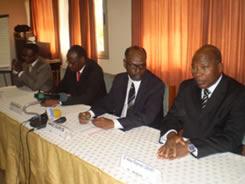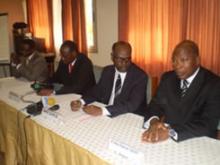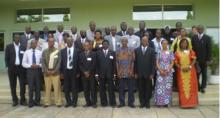Benin Hosts the First International Training Course on Management of TB/HIV Co-Infection Control and Drug-Resistant TB in Africa
The official opening of this event at the Regional Institute of Public Health was chaired by Professor César Akpo, representing the Minister for Higher Education and Scientific Research
Ouidah, 11 April 2011 -- The Regional Institute of Public Health (IRSP), based in Ouidha, Benin, has launched the first international training course on management of TB/HIV co-infection and drug-resistant TB. The course is jointly organized by IRSP, World Health Organization (WHO), West African Health Organization (WAHO) and the Joint United Nations Programme on HIV/AIDS (UNAIDS).
The six-week course aims to strengthen the capacity of the health workforce, the public and private sectors and other community actors and to upgrade health systems performance in the control of TB/HIV co-infection and drug-resistant TB.
Several dignitaries as well as local, regional and international authorities graced this highly colourful ceremony with their presence.
Addressing the gathering, Professor Michel Makoutode, Director of the Regional Institute of Public Health, welcomed the 25 participants from nine countries of west and central Africa, namely, Benin, Burkina Faso, Burundi, Cameroon, Guinea, Mali, Niger, Senegal and Togo.
According to Professor Makoutode the holding of the workshop reflects strengthening of the ties of technical cooperation and collaboration between WHO and all the other stakeholders including Benin. He noted that training and research are two cornerstones of development. That underscores the crucial and strategic importance of the organization and holding of the training course on TB and HIV, two major diseases targeted in the Millennium Development Goals.
Dr Gatien Ekanmian, representing the UNAIDS Director-General, stressed the importance and interest that UNAIDS give to TB/HIV co-infection. Citing the WHO Global Tuberculosis Control Report 2010, Dr Ekanmian stressed that TB control and drug resistance pose many challenges, yet, in the current context of financial crisis, their funding is decreasing, which is unfortunate. According to UNAIDS, people living with HIV need not die of tuberculosis. We should facilitate universal access to HIV prevention, treatment, care and support which should henceforth include prevention, diagnosis and treatment of tuberculosis.
When he addressed the gathering, Dr Akpa Raphael Gbary, WHO Representative in Benin felt that the high burden of tuberculosis is related to the emergence of new challenges such as TB/HIV co-infection and multidrug resistant TB. He went on to say that the African Region which accounts for only 12% of the global population recorded 23% notified TB cases worldwide.
Recounting the part Benin has played in the battle against TB, Dr Gbary mentioned that the country has achieved encouraging results. It had reported 3878 TB cases by 31 December 2009 and recorded a treatment success rate of 89% countrywide, thereby exceeding the 85% target recommended by WHO. Benin has also carried out collaborative activities in TB/HIV co-infection, enabling 96% of TB patients to be tested for HIV and 40% of sero-positive TB patients to receive ARV treatment. In addition, for almost the past 20 years, Benin has been hosting the international course on TB control organized by the International Union against Tuberculosis and Lung Disease (IUATLD).
Professor Giovanni Battista Migliori, representing the WHO Collaborating Centre for Control of Tuberculosis and Lung Disease of the Salvatore Maugeri Foundation, Italy, emphasized training and research as two main pillars for effective and relentless control of tuberculosis and HIV, two killer diseases. One of his functions in Italy focuses on training and research for TB control cadres and technicians. He stated that he had come to Benin to share his modest experience in this area with the nine country participants attending the course at the IRSP, Ouidah.
Professor César Akpo, representing the Minister for Higher Education and Scientific Research, Benin, then officially opened the training course. He underlined the importance of the training which, in his opinion, was taking place at the right moment, reflecting the will of the participating countries to provide their cadres with adequate specialized training for better organization and monitoring of the control of TB/HIV co-infection and drug-resistant TB.
Professor Akpo explained that the course was intended to be organized annually to help obtain a critical mass of health workforce competent in combined TB/HIV control. He further explained that the training will be followed ultimately by the introduction of a two-year course (Masters Degree). He hailed the proven experience of the course facilitators and affirmed that the participants will, no doubt, leave the IRSP, Ouidah, equipped with the tools they needed to carry out their different tasks in their respective positions.
Participants took a group photograph at the end of the official opening ceremony of the international course on management of the control of TB/HIV co-infection and drug-resistant TB. The training is facilitated by Professor Bah Keita, TB Programme manager, WHO Regional Office for Africa ; Professor Oumou Bah Sow, Coordinator of the International Course; Professor Giovanni Battista Migliori, WHO Collaborating Centre for Control of Tuberculosis and Lung Disease, Salvatore Maugeri Foundation; Dr Edgard Marius Ouendo, Pedagogical Coordinator of the training course; Dr Henriette Wembanyama, WHO Regional Office for Africa; Dr Delphine Sculier, WHO headquarters, Geneva; and Dr Leon Tawo, national TB Control Programme, Benin.
For further information, please contact : François AGOSSOU, NPO/HPR Officer, in charge of Health Promotion, WHO/Benin agossouf [at] bj.afro.who.int (agossouf[at]bj[dot]afro[dot]who[dot]int)
+ 229 97290254;
Flavienne ISSEMBE, Communication and Media Unit, WHO Regional Office for Africa issembef [at] afro.who.int (issembef[at]afro[dot]who[dot]int)
+ 242 066531406;
or the United Nations Information and Documentation Centre, Benin ahouangbol [at] bj.afro.who.int (ahouangbol[at]bj[dot]afro[dot]who[dot]int) + 229 30.19.07. Fascimile: + 229 30.42.08. Address: B.P. 918, Cotonou, Benin.





